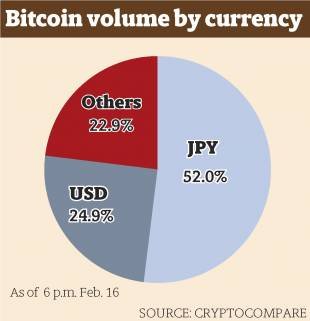The ¥58 billion digital token heist at Tokyo-based exchange Coincheck last month reminded several of the disreputable Mt. Gox debacle in 2014 and revived dialogue on a vital question: is that the cryptocurrency boom a furor or a prelude to real innovation?
The underlying technology of cryptocurrencies — most notably bitcoin — is usually touted as one thing that might drastically alter the landscape of the money sector. however Japan-based specialists interviewed by The Japan Times say virtual currencies square measure too volatile and have many technological hurdles to beat before universal adoption becomes potential.
“It is uncertain that bitcoin or different digital currencies with high volatility are used as a payment or cash transfer methodology,” aforesaid Daisuke Yasaku, a research worker at Daiwa Institute of analysis.
But technological evolution can continue, and digital currencies can become a plausible possibility in some sectors as massive corporations and banks prepare to develop their own currencies to be used in their business circles, specialists aforesaid.
“We’ll be seeing several sorts of virtual tokens that may be used for numerous ecosystems apart from the act currencies within the future,” aforesaid Junichi Kanda, associate degree govt at Tokyo-based money technologies firm cash Forward INC. associate degreed an professional on cryptocurrency.
Since bitcoin debuted in 2009, its underlying technology, the blockchain, has been publicised as associate degree innovation. It works on a peer-to-peer network that directly links people’s computers while not looking large, valuable servers.
The blockchain may be a public ledger that records every dealing from the start. the information are often reciprocally and at the same time monitored by people known as “miners,” that makes falsification effectively not possible while not the involvement of a central administrator.
The blockchain system is additionally cheaper to control than its typical counterparts, refueling hopes that virtual currencies will anchor a replacement money infrastructure.
The cryptocurrency trend has conjointly created waves within the field of fundraising, wherever a firm want to draw investment discloses its business set up on-line and problems its own digital tokens through a alleged initial coin providing. If investors assume the business is promising, they exchange their bitcoins or different currencies for the company’s tokens within the expectation that their worth might rise.
While the apply has however to require off in Japan attributable to the emergence of regulation, it's become well-liked overseas as a result of corporations will raise cash while not looking forward to capital or going public.
The heated enthusiasm for virtual currencies has crystal rectifier to a lucid bubble. Indeed, bitcoin’s worth movements are wild and unpredictable. A year ago, the value was floating between ¥120,000 and ¥140,000. It unbroken increasing and at last shot up to over ¥2 million in Gregorian calendar month — solely to plummet to regarding [*fr1] that in Gregorian calendar month.
Yasaku of Daiwa Institute of analysis aforesaid virtual tokens with such sturdy volatility will solely be used as a distinct segment kind of payment.
He conjointly realized that there square measure technological problems that limit the potential of bitcoin. as an example, the bitcoin system will handle solely five hundred,000 payment transactions daily.
This limit, and therefore the skyrocketing range of speculators, have slowed bitcoin’s dealing speed and significantly pushed up conversion fees at cryptocurrency exchanges. different currencies, known as various coin, are often sent quicker and cheaper than bitcoin. These embrace ether and ripple.
Yasaku aforesaid technological improvement could lead on to the broader use of digital currencies. In fact, that potential is outwardly drawing corporations and banks into the fray World Health Organization have an interest in production tokens with less volatility.

Big names as well as Line corporation. have already shown interest in cryptocurrency, and therefore the domestic industry is moving to utilize the sensible power of blockchain technology.
“There may be a growing sense of crisis among banks in Japan when 2 to a few decades with a declining economy. The banks square measure wanting to use blockchain to cut back prices and build new business,” aforesaid Emi Yoshikawa, director of venture partnerships at Ripple Labs INC., that created ripple.
The San Francisco-based firm helped produce the Japan Bank association, a gaggle of sixty one banks representing over eighty p.c of the country’s banking assets.
With the assistance of Ripple Labs, the association aims to seek out business uses for blockchain technology, like platforms for creating cross-border or individual payments through smartphone apps, Yoshikawa aforesaid.